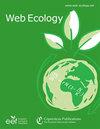毛枝Cladonia rangiformis和Erica sps的空间异质性对土壤微生物群落产生了不同的影响,其中裸露土壤微生境中微生物群落最为活跃
IF 2.4
3区 环境科学与生态学
Q2 ECOLOGY
引用次数: 0
摘要
摘要生物结皮是干旱半干旱区土壤的重要组成部分,但关于结皮、植物和土壤微生物相互作用的空间异质性研究有限。取样区域要么是被灌木覆盖,要么是被地壳覆盖,要么是未被地壳覆盖。沿着从灌木基部到灌木外围100 cm的直线,在连续20 cm的距离上采集一次土壤样品。估算了土壤微生物群落成员的生物量、组成和相互作用网络以及参与碳、氮、磷循环的土壤酶活性。由于地衣中抗菌物质的浸出,结皮覆盖对土壤微生物生物量具有显著的化感负作用。相反,结皮对酶活性的影响为正,可能是由于土壤非生物条件的改善。与灌丛基部的距离对土壤微生物和细菌总生物量有影响,灌丛基部的微生物和细菌总生物量较低。不同采样点间微生物群落组成差异显著。网络分析表明,在无结壳土壤中,连接最多的微生物网络是在距离>60 cm的样品(裸土)处收集的,而在结壳土壤中,这是在灌木基部收集的样品。结果表明,微生物生物量对空间异质性的响应有限,而微生物成员间相互作用的组成和拓扑结构反映了地中海地区小空间尺度上的非均质土壤环境。裸露土壤中的微生物群落似乎对未来的干扰最强大。本文章由计算机程序翻译,如有差异,请以英文原文为准。
Spatial heterogeneity of Cladonia rangiformis and Erica spp. induces variable effects on soil microbial communities which are most robust in bare-soil microhabitats
Abstract. Biological soil crust (BSC) is an essential part of arid and semiarid regions;
however information concerning the spatial heterogeneity of the interactions
between crust, plants and soil microbes is limited. Sampling was confined to
an area either covered with Erica spp. shrubs interspaced by crust cover
(Cladonia rangiformis) or uncovered by crust. Along a straight line of 100 cm from the
base of the shrubs towards their periphery and at successive distances of 20 cm, soil samples were collected once. The biomass, the composition and the
network of interactions among the members of the soil microbial communities
as well as the activity of soil enzymes involved in the C, N and P cycle were
estimated. Crust coverage exerted a significant allelopathic negative effect
on soil microbial biomasses due to the leaching of lichen's antimicrobial
substances. In contrast, the crust effect on enzyme activity was positive,
probably due to the amelioration of soil abiotic conditions. The distance
from the base of Erica spp. affected the total microbial and bacterial biomass,
with lower values at the base of the shrubs. The composition of microbial
communities between the different sampling points exhibited significant
dissimilarities. Network analysis revealed that in uncrusted soils the most
connected microbial network was at samples collected from a distance
of >60 cm (bare soils), while in crusted soils this was at samples
collected at the base of shrubs. We concluded that microbial biomass showed
limited response to spatial heterogeneity, while the composition and the
topology of interactions among the microbial members reflected a
heterogeneous soil environment existing on a small spatial scale in
Mediterranean areas. The microbial community in bare soil appeared to be the
most robust against future disturbances.
求助全文
通过发布文献求助,成功后即可免费获取论文全文。
去求助
来源期刊

Web Ecology
Agricultural and Biological Sciences-Ecology, Evolution, Behavior and Systematics
CiteScore
4.60
自引率
0.00%
发文量
6
审稿时长
17 weeks
期刊介绍:
Web Ecology (WE) is an open-access journal issued by the European Ecological Federation (EEF) representing the ecological societies within Europe and associated members. Its special value is to serve as a publication forum for national ecological societies that do not maintain their own society journal. Web Ecology publishes papers from all fields of ecology without any geographic restriction. It is a forum to communicate results of experimental, theoretical, and descriptive studies of general interest to an international audience. Original contributions, short communications, and reviews on ecological research on all kinds of organisms and ecosystems are welcome as well as papers that express emerging ideas and concepts with a sound scientific background.
 求助内容:
求助内容: 应助结果提醒方式:
应助结果提醒方式:


